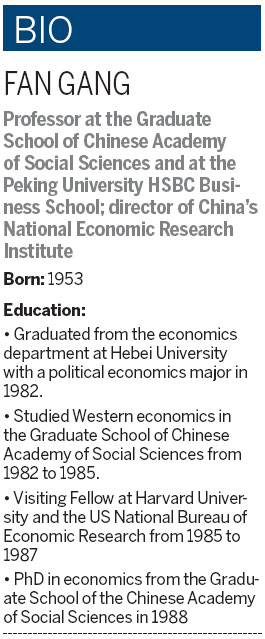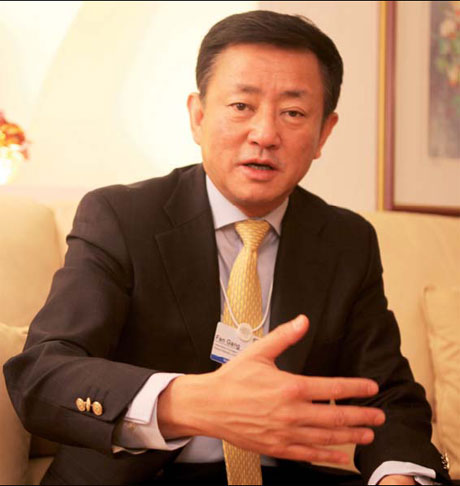Making the right choices
Updated: 2013-03-08 07:40
By Fu Jing (China Daily)
|
||||||||
|
It is important to have an institution to oversee the process of reform in China, says Fan Gang. Fu Jing / China Daily |
China needs to establish a reform agenda for growth and stability, economist says
The new leadership in China should establish an agenda of reform to renew economic growth and social stability for the coming decade, says economist Fan Gang.
Fan, who was involved in the recent policy deliberations, says the leadership under former Party chief Hu Jintao had been successful in maintaining economic growth over the past decade and that the "new leadership should also have similar skills to control the economy".
According to Fan, director of the National Economic Research Institute for the China Reform Foundation, if China's new leaders are not as economically adept as the leaders they have replaced, "it will be disastrous if we meet the same financial and debt crises that the US and Europe are suffering from".
The biggest legacy of China's leadership under Hu was their management skills that allowed the government to successfully avoid an economic crisis amid global interdependency.
China must maintain its economic momentum, Fan says, which can only be achieved through reforms and a clear separation of the roles of government and market.
He says China has maintained its economic development during the previous decade despite massive challenges. Between 2005 and 2007, China experienced double-digit growth while economic bubbles surfaced in Western countries, he says. At the time, China's local governments were heavily investing in real estate, creating the country's own property bubble.
Fortunately, the government took measures to curb prices and when the global financial crisis, originating from the US, took its toll in late 2008, the Chinese government unveiled its multibillion-dollar stimulus package to speed up economic growth.
"So generally speaking, we didn't meet excessive overheating during the past 10 years and we didn't have a hard landing or crisis to adjust our economy. We realized an economic soft landing, which is a big success," Fan says. "So macroeconomic management is very important for the new leadership and we need to guard against economic or financial crisis."

Apart from managing the economy, Fan says the government has shaped China's current social welfare system and has made progress in financial reform and in internationalizing the renminbi.
"During the past decade, the US has been putting pressures on us and we have reformed our financial system without a hitch," Fan says.
Currently, the international community has backed off from their concerns about the reliability of China's growth after its economic soft landing and as market expansion opportunities increase, he says. China has also continued the process of changing its development model to focus more on domestic consumption.
"These factors have assuaged global concerns of China's short-term growth potential," Fan says, adding that what the international community worries about is the kind of reform China will implement.
Fan says the first issue the central government must address is to implement reform that holds the government more responsible while it separates itself from economic activities. The second is that China should establish an institution to oversee the process of reform.
"If the government doesn't reform itself, there is no real reform; and if there is no such institution to coordinate interests of different organizations, the reform will not be successful."
After China's new Party leadership took office in November, Fan says he sensed their commitment to reform based on what they have recently said and published.
Fan admits that during previous decades, the government played a dominant role in developing a market economy. But, Fan says: "We are in the process of developing an economy with private sectors playing a major part and so we must clearly define the boundaries of the market and the government."
He hopes to see the government focus on public services and rules instead of controlling national economic activity. Fan also says the government is now saddled with too many public responsibilities, most of which are unnecessary.
"Because of excessive rights of the government, it is prone to corruption," Fan says. "So, in streamlining the government role, the most important thing is to reduce their public rights."
The government has rendered too many privileges to state-owned enterprises, which ideally should be treated equally with private companies, he says.
Like many advisers, Fan wants to define the roles and relationships of the central, provincial and local governments. While local governments should be granted rights to finance their own projects, it is too risky to give them a wide range of rights.
"We need to find a balance in defining their duties," Fan says.
He says the Chinese government should also provide services to farmers-turned-migrants and treat them equally as urban residents.
Fan says China is facing a major challenge to reform. "It will take time and I think the major steps will not take place until the latter half of this year," he says.
China's leadership has been in transition since November when the 18th National Congress of the Communist Party of China convened. Currently, national lawmakers and political advisers are set to elect government leaders.
Fan says the leadership should consider setting up an overarching institution to formulate a timetable and roadmap for reform. It is crucial to have such an institution to coordinate an agenda of reform, which currently is mainly implemented through the efforts of the National Development and Reform Commission. China had a ministerial-level institution under a decade ago to carry out this task. This was under the direct supervision of the government and the premier.
"Currently, the reform institution (a department of the commission) has faced mounting difficulties to coordinate the interests of each ministry. This is mainly due to its diminished authority," he says.
One of the government's first steps should be to step back from its administrative, pricing and economic roles, he says, and to maintain "smooth growth, offer public goods and social welfare in a market economy".
Fan is currently conducting theoretical analysis about China's economy beginnings, industrialization, urbanization, social welfare, income disparity and measures for Chinese people to avoid becoming trapped in middle class incomes.
"I am busy with theoretical research about China's development drama," Fan says. "I think because of China, the textbooks of development economics will be enriched."
fujing@chinadaily.com.cn
(China Daily 03/08/2013 page24)

 Li Na on Time cover, makes influential 100 list
Li Na on Time cover, makes influential 100 list
 FBI releases photos of 2 Boston bombings suspects
FBI releases photos of 2 Boston bombings suspects
 World's wackiest hairstyles
World's wackiest hairstyles
 Sandstorms strike Northwest China
Sandstorms strike Northwest China
 Never-seen photos of Madonna on display
Never-seen photos of Madonna on display
 H7N9 outbreak linked to waterfowl migration
H7N9 outbreak linked to waterfowl migration
 Dozens feared dead in Texas plant blast
Dozens feared dead in Texas plant blast
 Venezuelan court rules out manual votes counting
Venezuelan court rules out manual votes counting
Most Viewed
Editor's Picks

|

|

|

|

|

|
Today's Top News
Boston bombing suspect reported cornered on boat
7.0-magnitude quake hits Sichuan
Cross-talk artist helps to spread the word
'Green' awareness levels drop in Beijing
Palace Museum spruces up
First couple on Time's list of most influential
H7N9 flu transmission studied
Trading channels 'need to broaden'
US Weekly

|

|









